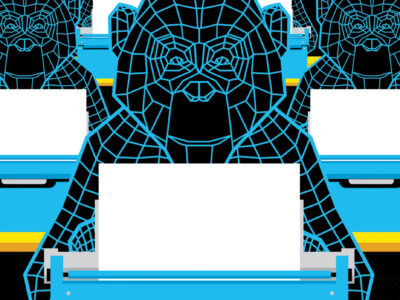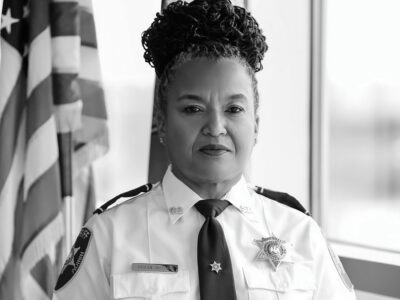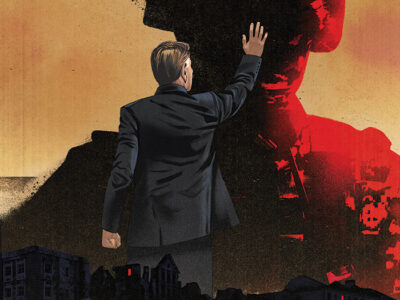In the decade and a half since he graduated from Penn, legal scholar and internet enthusiast Lawrence Lessig has emerged as a leading thinker in the application of Constitutional concepts to the realm of cyberspace—and gotten Bill Gates (among others) mad at him.
By Phil Leggiere
It was nearly a century ago that historian Frederick Jackson Turner regretfully announced the closing of the America’s geographical frontier. Yet the idea of the frontier, as he’d probably be happy to know, has remained very much alive — inspired in our era primarily by new technological revolutions.
Indeed, the newest and vastest of our technological frontiers, the Internet, given the name cyberspace by novelist William Gibson, is a realm that brings to mind for many the wilderness Turner celebrated. Like Turner’s frontier, “the meeting point between savagery and civilization,” cyberspace is filled with a strange mix of pioneers, visionaries, utopians, inventors, explorers, prospectors, speculators, crackpots, flesh-peddlers, and outlaws.
Ironically enough, even though the Net is a creation of the government (the Defense Department, to be exact) the settlers of cyberspace, like many pioneers before them, are animated by a rampant hostility toward governmental intervention in their newfound (virtual) land. In the words of one of the most influential of the digerati, author John Perry Barlow, “Governments derive their just powers from the consent of the governed. You (The Federal Government) have neither solicited nor received ours. We did not invite you, nor do you know our world. Cyberspace does not lie within your borders. It is an act of nature and it grows itself.”
That “Don’t Tread on Me” spirit is more than mere rhetoric. When in 1995 Congress passed the ill-fated Communications Decency Act (later struck down by the Supreme Court), which, in the name of protecting children against indecency, would have made it a crime for an adult to send a text file of the works of Chaucer to a high-school senior, the move quickly spawned an opposition that has been called the largest free-speech movement in a generation.
Lawrence Lessig, W’83, Constitutional scholar and Harvard University law professor, long-time Internet enthusiast, and nationally regarded expert in law and information technology, was a vigorous supporter of the anti-CDA movement, speaking out publicly against the law. In addition, the 37-year-old Lessig, who has been called “one of the most brilliant legal minds of his generation” by The Washington Post, says he “abhors” most of the attempts by the government so far to regulate the Net. When it comes to thinking about policies for the future of the new medium, however, Lessig believes the “naive libertarianism” of his compatriots is all wet.
“The real danger to freedom on the Net,” he insists, “is not so much government regulation, as it is ignorance about how power, private power, as well as public” actually is exercised in this new medium. “People, in their single-minded obsession with government, are ignoring the ways in which the Net is already being regulated” by the laws of the market and by what Lessig calls the “architecture or code” of software, which truly shapes social existence on the Net, often without accountability to Constitutional values.
As an example of how seemingly innocuous privately designed “code” has the potential to be far more tyrannical than public law, Lessig offers Platform for Internet Content Selection (PICS), a tool for filtering objectionable content on the Web that is being touted by many activists and civil-liberties groups as a “private, market-oriented” alternative to government regulation of Net speech.
“PICS is presented as a harmless tool allowing parents to filter Net material to protect their children from things they don’t want them to see,” says Lessig. “In reality, though, it’s much more, and much more diabolical, than that. PICS is not a mere filtering technology, it’s a labeling standard which allows filtering to be imposed on any level of the distribution chain, whether it’s a home, a library, a company, an Internet service provider (ISP) or a state, for any kind of content.” From a free-speech point of view, Lessig believes, an architecture like PICS, hidden from public accountability, can be far more dangerous than direct government regulation. Yet through their knee-jerk belief in the superiority of “private” solutions to government intervention, Lessig complains, many Net activists continue to miss the big picture.
To clear up these blindspots, Lessig has been tireless over the past two years in addressing both arcane and practical issues of Net governance wherever he can, engaging in dialogue and debate with all different factions, from “Hands Off the Net” libertarians to Internet industry heavyweights to legislators. According to David Post, professor of law at Temple University and co-chair of the Cyberspace Law Institute, “Larry holds a unique position in cyberspace law. He’s one of the few people around who’s respected both in scholarly legal circles and among the wider public outside the field. I think he’s been invaluable in focusing public attention on legal issues at stake on the Net.”
More than once, this process has involved telling audiences — opinionated and powerful ones — things they’d prefer not to hear.
For instance, at the New York New Media Association conference last June, attended by Clinton administration Internet policy guru Ira Magaziner and cyber-pundit Esther Dyson, Lessig publicly hammered the Clinton administration’s strategy of using private non-governmental agencies to set Internet copyright and domain name policy, charging that such privatized approaches to regulation would leave “the biggest new jurisdictional territory since the Louisiana Purchase” operating outside any public accountability. Last August, Lessig made the unpopular case for government regulation of the architecture of cyberspace before the conservative free-market-oriented Progress and Freedom Foundation’s annual forum in Aspen, Colorado, where he’d been invited as keynote speaker.
Such heresies have made Lessig a lightning rod of controversy among some movers and shakers of the cyber-world. John Perry Barlow, after describing Lessig at the Progress and Freedom Foundation forum as “the ultimate quick red fox. The most clever thinker in Internet law, with a profound grasp of technical issues,” complained that, as a stalking horse for big government, “Larry wants to make cyberspace safe for law, while I want to keep law out of cyberspace.”
Not everyone opposed to government regulation agrees with this interpretation of Lessig’s motives, however. Jeff Eisenach, the Foundation’s president, says, “I regard Larry as one of the most creative thinkers involved in Internet issues. What I hear him calling for is not so much more or bigger government, but a more nuanced, thoughtful approach to what role government should play in cyberspace.”
The studious, soft-spoken Lessig is an unlikely activist. “I’m really happiest in the Ivory Tower,” he admits, surrounded by tomes of Constitutional theory, his greatest love, and philosophy. Despite his hectic schedule, Lessig maintains a full academic teaching load at Harvard, leading courses in subjects such as Contracts, High Tech Entrepreneurship, and The Civil War Amendments. “Polemic and politics will never have the appeal for me of studying and teaching,” he says. Fate and circumstance, though, have conspired more and more to keep him away from his study. These days, like it or not, Lessig finds himself uneasily dividing his time between the Ivory Tower and the front lines of debate.
Lessig’s rendezvous with intellectual celebrity began in December 1997, when U.S. District Judge Thomas Penfield Jackson appointed him a “special master” in the Justice Department’s anti-trust case against Microsoft, a move that quickly propelled him into a hornet’s nest of controversy for several months in early 1998. Originally chosen by Jackson to use his extensive computer knowledge to help interpret the technical details of the case into a legal context, his appointment was fought tooth and nail by Microsoft, which, based on its interpretation of some of his published writings and private e-mails, viewed him as biased against Microsoft in particular and Big Business in general. Though Microsoft’s bias charges were rejected, the U.S. Court of Appeals for the District of Columbia removed Lessig from the case by eliminating the role of special master, arguing that it would have made Lessig in effect a surrogate judge.
While Lessig won’t speak publicly about the details of the case, which are still being debated in the courts, he does make it clear that his views on anti-trust are far from rigid, admitting that he finds anti-trust law in the Information Age a very ambiguous matter at this stage. “In the early 20th century,” he explains, “the motivation of people like Louis Brandeis, Felix Frankfurter, and others was that bigness is bad. Somewhere along the line, by the time of the Chicago School, the model changed to ‘efficiency is good.’ The relationship between size and efficiency in the context of the Internet is, at this early stage, very unclear. No one’s got a real gauge on how to reconcile those two issues.” He finds the arch-free-marketer Robert Bork’s emergence as a defender of the Department of Justice’s suit (a move that puts Bork in the same camp with Ralph Nader) the most delicious irony of the case — as well as a testimony to current confusion.
Though Lessig’s rise to the public limelight was swift, the intellectual odyssey behind his involvement in Internet issues was many years in the making. It involved the convergence of two obsessions, computers and the constitution, which had shaped his development since college. “I’ve been hacking around with computers for a long time,” he recalls. “In college, I got one of the early IBM PCs and helped set up accounts for Sigma Chi fraternity.”
After graduating from Penn, Lessig studied philosophy at Trinity College, and later, in 1989, graduated from Yale Law School. A self-described liberal, he clerked for two of America’s foremost conservative judges, the Supreme Court’s Antonin Scalia, who was fascinated by Lessig’s computer savvy, and Richard Posner of the 7th U.S. Circuit Court of Appeals, who, Lessig says, “liked having someone to argue with.” He then moved to the University of Chicago, where as a young professor of Constitutional Law, he distinguished himself as one of the founding lights of a burgeoning legal approach now called the New Chicago School, a theoretical movement which has informed his thinking on cyberspace law.
“The New Chicago School,” Lessig explains, “has several aspects, some very technical. Most broadly, it’s about finding a way to systematically talk about the different things that regulate conduct and social behavior. Law is one of them, but there are other hidden ways in which people are regulated. Markets regulate, social norms regulate, and, especially in the world of technology but in the world of nature as well, codes regulate.” As a mundane example, Lessig cites driving speeds. A law prohibiting speeding is one way to regulate. Speeding, however, can also be regulated by changing social norms, by educating communities about its dangers. Another way to regulate is through the architectural code of the road, using speed bumps.
Lessig’s decision to focus on Internet law was the result of an accidental “epiphany” he had back in December 1993. “I was reading an article in The Village Voice called ‘A Rape in Cyberspace,'” he remembers, “right after I’d been reading Only Words by Catherine McKinnon, a very dramatic book about the harm caused by pornography. It’s hard to think of an odder ideological mix than McKinnon and the Voice. It’s oil and water. McKinnon, an anti-porn activist, the Voice the epitome of First Amendment ultra-liberal absolutism. Yet, at one point the Voice author, Julian Dibbell, admitted that the purely verbal assault he was reporting on cyberspace was, indeed, rape. He admitted that, despite his earlier beliefs, words could cause real harm.
“It was an amazing revelation,” Lessig concludes. “I realized that if cyberspace could get McKinnon and the Voice to agree on anything, it had an amazing power to knock people off their usual political bearings. To force them to look at old issues anew. That excited me immediately.”
For Lessig, the dislocations provoked by the new medium promised to be a profound challenge to the Constitutional tradition, and, he hoped, a spur to new creativity. His professional preoccupation ever since has been to chart out new directions. In this endeavor, he’s been guided above all by the spirit of another legal thinker who grappled in the early 20th century with a world also in the throes of technological and social transformation — the legendary Supreme Court Justice Louis Brandeis. “If there is a Justice who deserves the Cyberworld’s praise it is this Justice,” Lessig wrote two years ago in his influential article “Reading the Constitution in Cyberspace,” praising Brandeis’s famous opinion in Olmstead vs. The United States (1928) that the meaning of the Fourth Amendment, originally intended to limit trespass on one’s physical property, should in the era of the telephone be extended to protect individuals against unauthorized wiretapping.
Lessig believes Brandeis’s method of translating the original values of the Constitution into new contexts created by technological change is one which should inspire new legal thinking about cyberspace. “Unlike Originalists, who believe that fidelity requires doing just what the framers would have done,” he has written, “the translator understands that to preserve meaning across contexts, one must change readings across contexts.”
Between his teaching schedule and stints on the road, Lessig is trying to find the time to synthesize his ideas in a book, tentatively entitled Code and the Law of Cyberspace. “One big theme of the book is that we need to get people to stop thinking about regulation as if it’s only something the government does. We need to start thinking about regulation in the sense that the architecture of the Internet regulates,” he says. “The Constitution has yet to catch up with this shift, to develop a way to express Constitutional values in the context of indirect regulation. Code becomes a sovereign power all its own in cyberspace. But the question is: Who authorizes this sovereignty and with what legitimacy?”
As an example of successful indirect regulation of code, Lessig cites Congress’s recent decision to regulate the code of compact-disc sound reproduction via digital audiotape. By requiring producers to install a chip that monitors the number of copies made of any particular tape, Lessig believes, Congress balances protection of CD-makers’ copyrights, by effectively prohibiting wholesale digital reproduction, with the consumer’s fair-use rights to make personal copies.
In the book Lessig hopes to explore what light such a regulation-by-code approach might shed on Internet topics ranging from encryption and privacy issues to free speech, intellectual property rights, and the conflict between commercial and public use of the medium. One thing such regulation should not mean, he insists, is the government putting itself in the “absurd” position of trying to write code. What it likely would involve is the “government pressing to insure that codewriters build structures that foster basic Constitutional values and resisting those that don’t.”
Once the book is published, Lessig hopes to retreat for a while from public controversy and return to a more private existence. He acknowledges that that might be easier said than done, however. As the issues to which he’s devoted his professional life become the subject of crucial political and judicial decision-making over the next several years, it’s hard to imagine Lessig not playing a major public role.
Phil Leggiere, C’79, has written for Wired, the on-line magazine Salon, and many other publications. He lives in Hoboken, N.J.




